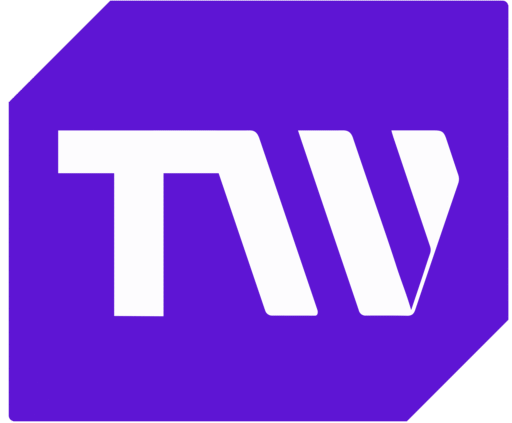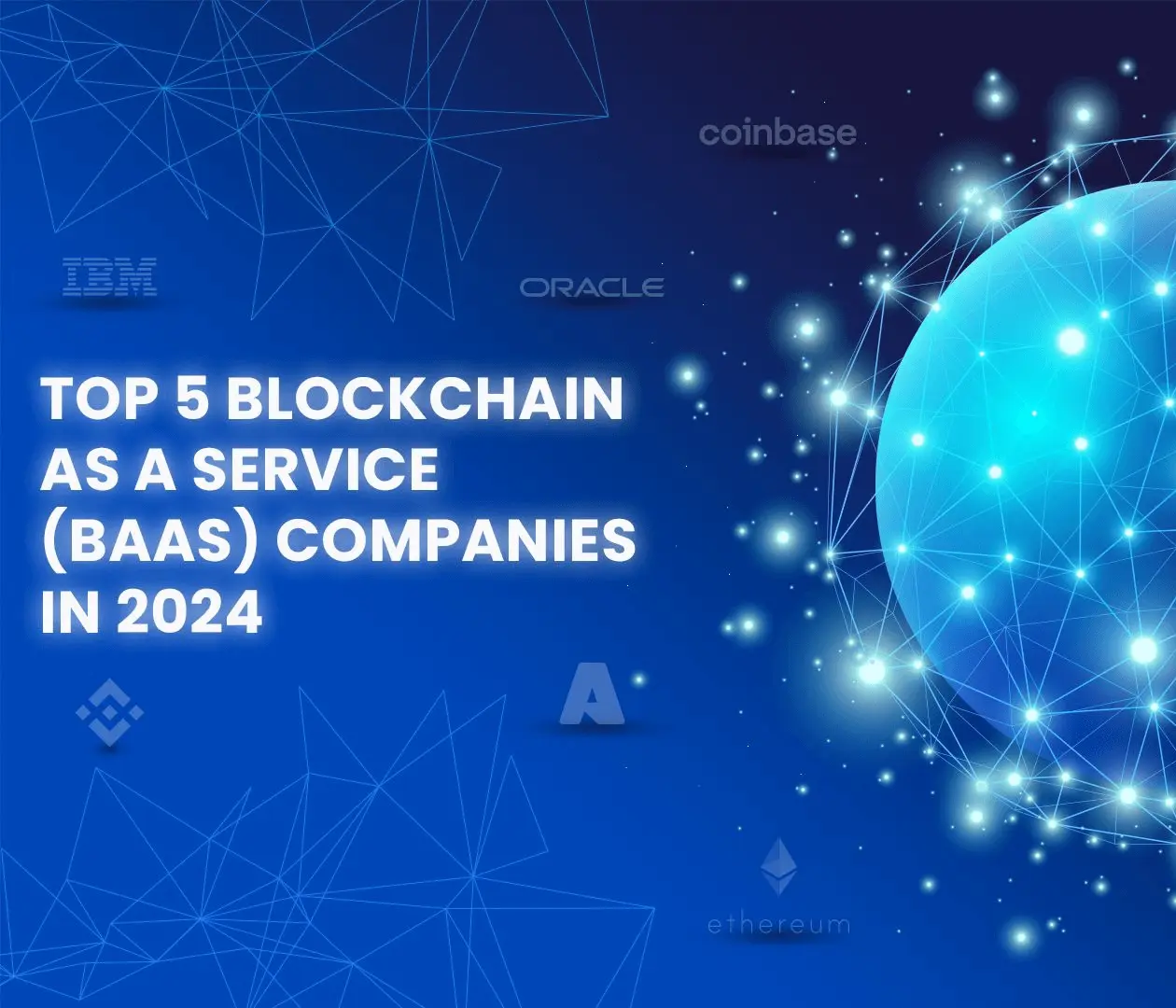Top 5 Blockchain as a Service Companies (BaaS) in 2024
Blockchain technology has evolved over the years from a cryptocurrency framework to a multifaceted tool that streamlines the operations of businesses across various industries. As such, businesses are increasingly seeking ways to integrate blockchain technology into their operations without needing to create or maintain their own blockchain infrastructure. This demand has led to the rise of Blockchain as a Service (BaaS) platforms.
BaaS platforms handle the complex backend operations of running and maintaining blockchain networks, allowing businesses to deploy blockchain applications easily and with minimal technical input.
In 2024, the BaaS landscape is dominated by companies that speed up the deployment of blockchain technology and ensure these solutions are accessible, scalable, and well-maintained. This article explores five of these key players and their innovative blockchain solutions.
1. IBM Blockchain Platform
IBM Blockchain is a subset of IBM Cloud services. It allows businesses in various sectors, such as finance, healthcare, and supply chain management, to build, host, and manage their blockchain networks. It’s built on the Hyperledger Fabric, an open-source blockchain framework hosted by the Linux Foundation.
The IBM Blockchain platform focuses on businesses and enterprises, designing enterprise-grade solutions to address their unique challenges and help them leverage blockchain technology. This allows them to solve complex business problems effectively, improve efficiency, and scale up.
The platform also operates on a distributed ledger technology, ensuring that all blockchain transactions are recorded and synchronized across multiple nodes on the blockchain network, providing security and transparency.
With the IBM Blockchain Platform, businesses (users) can benefit from features such as:
- Modular Architecture: This allows businesses to customize elements of the blockchain network to fit their specific needs.
- Developer tools and resources: IBM Blockchain provides developers with tools, tutorials, and resources to help them build and deploy blockchain applications effectively.
- Industry-specific solutions: IBM provides industry-specific solutions tailored to the needs of various sectors, giving them access to ready-made solutions to drive innovation, improve efficiency, and streamline their blockchain adoption.
- Scalability and performance optimization: The IBM Blockchain Platform supports high transaction volumes and can handle complex business processes seamlessly. It also offers various features to optimize performance, like low latency, horizontal scalability, and resource optimization.
IBM Blockchain’s clients include Home Depot, Renault, Atea, New York State, Banque de France, RCS Global, and Newlight Technologies.
2. Amazon Managed Blockchain
Amazon Managed Blockchain is a fully managed blockchain service provided by Amazon Web Services (a subsidiary of Amazon).
Amazon Web Services (AWS) was created in March 2006 to provide a comprehensive suite of cloud computing services and APIs (Application Programming Interfaces) to individuals and businesses, like computing power, database management, and machine learning, with the aim of helping them build and deploy flexible and scalable applications and services.
However, in 2018, numerous AWS users wanted to be able to make transactions and maintain secure records of them from multiple sources without needing approval from a central authority. So, AWS introduced its solution: Amazon Managed Blockchain. With Amazon Managed Blockchain, customers can create and set up a blockchain on the AWS Management Console.
Users can ordinarily create blockchain networks using open-source blockchain frameworks like Ethereum and Hyperledger Fabric, but setting up the networks using these frameworks is difficult and time-consuming. Amazon Managed Blockchain solves these problems with its fully managed blockchain service, which provides easy, cost-effective ways for customers to create and manage secure blockchain networks. How?
AMB integrates with various open-source blockchain frameworks, so customers can simply choose their preferred framework (Bitcoin, Ethereum, Polygon, or Hyperledger Fabric), add their network members, and configure the member nodes responsible for processing transaction requests.
Then, Amazon Managed Blockchain handles the rest—creating a blockchain network that spans across multiple Amazon Web Services accounts and configuring the software, security, and network settings.
In addition to these, AMB users also enjoy:
- Seamless integration with other AWS features: AMB seamlessly integrates with other Amazon Web Services features, like Amazon S3 for data storage, Amazon CloudWatch for monitoring, and AWS Key Management Service (KMS) for encryption—with no ETL (extract, transform, and load) or specialized blockchain infrastructure needed.
- Scalability: AMB is designed to scale to support thousands of applications and millions of transactions, making it suitable for businesses of all sizes. It also offers features like Auto Scaling and Elastic Load Balancing to help enterprises scale their applications and adjust them to their needs.
- Cost-effectiveness: Amazon Managed Blockchain charges on a pay-as-you-go basis—customers only pay for what they use. They have two payment options:
- A dedicated service that bills according to usage factors like node instances, API requests, data transfer sizes, and storage.
- A serverless service that bills based on the volume of API requests and the complexity of the requested APIs.
AMB’s clients include Nestlé, AT&T, BlockSee Depository Trust & Clearing Corporation (DTCC), Guardian Life Insurance Company, Riverside County, California, Singapore Exchange Limited (SGX), and SUSMED.
3. ConsenSys Quorum Blockchain Service
ConsenSys Quorum is a blockchain service that allows businesses to set up and manage decentralized applications on the Blockchain. It’s hosted on Quorum, a forked version of Ethereum designed specifically for enterprise-level use. Consensys Quorum offers users two platforms:
- Hyperledger Besu for use with the Ethereum mainnet or permissioned networks
- GoQuorum, strictly for permissioned networks (private and inaccessible to the public) only.
Its key functionalities include:
- Enterprise-level solutions: ConsenSys Quorum is built specifically to cater to businesses’ needs. It provides features like private transactions and performance enhancements to help businesses keep sensitive information private while leveraging the efficiency, transparency, and security benefits of blockchain technology.
- Developer tools: ConsenSys offers a developer portal that provides all the necessary tools, resources, and documentation developers need to learn how to build on the Ethereum blockchain. Businesses can use these resources to develop and deploy blockchain applications more quickly and improve efficiency in their operations.
- Support for various use cases: ConsenSys Quorum is used across multiple industries, such as healthcare, finance, media, law, sports, energy, and the public sector, creating numerous use cases. This versatility showcases its adaptability and effectiveness in handling complex business problems. It also highlights blockchain technology’s potential to solve real-world problems.
ConsenSys Quorum doesn’t publicly list pricing details on its website, so potential customers have to contact them directly to get pricing tailored to their specific needs.
However, the platform is described as “an open-source protocol layer,” which indicates that there might be no initial cost for using the basic software, but users could be charged for operational, support, and customization services.
ConsenSys Quorum Blockchain Service’s partners include Visa, Allfunds, China’s Blockchain-based Service Network, and Microsoft.
4. Oracle Blockchain Cloud Service
Oracle provides blockchain solutions that help businesses streamline real-time collaboration and data sharing among multiple stakeholders. The company offers three primary solutions:
- Oracle Blockchain Platform Enterprise Edition
- Intelligent Track and Trace, a SaaS application for supply chain management and
- Oracle Blockchain Platform Cloud Service
Oracle Blockchain Cloud Service was designed to help businesses implement blockchain technology effectively. It’s built on Hyperledger Fabric and provides a secure and scalable platform for companies to develop blockchain applications.
The platform offers its users various benefits, like:
- Seamless integration with existing services: Oracle Blockchain integrates smoothly with other Oracle applications and cloud services. This makes it easier for businesses to implement blockchain solutions in their workflow without disrupting their existing IT infrastructure. For instance:
- Oracle ERP Cloud: This is suitable for businesses in the financial management sector. It simplifies financial processes, improves financial reporting accuracy, provides real-time insights into financial data, and supports multiple currencies, legal entities, and accounting standards.
- Oracle SCM (Supply Chain Management) Cloud: This helps businesses trace and verify the authenticity of goods as they move through the supply chain, enhancing supply chain visibility and fraud prevention.
- Automation with smart contracts: Oracle Blockchain allows businesses to automate complex processes and transactions using smart contracts, significantly reducing manual interventions, minimizing errors, and ensuring that contractual agreements are executed automatically. This feature is especially useful in the finance and real estate sectors, where contract execution speed and accuracy are crucial.
- Comprehensive monitoring tools: The Oracle Blockchain platform helps businesses monitor important performance metrics like transaction rates and network health. This ensures their blockchain operations run efficiently and helps them quickly identify and address operational issues.
Oracle Blockchain offers services from 48 public cloud regions in 24 countries. Its clients include NeuroSoft, Everledger, Arab Jordan Investment Bank, and Retraced.
5. Chainstack
Chainstack is a blockchain-as-a-service platform that offers an easy and fast way for individuals and businesses to create, manage, and scale blockchain applications. It simplifies the complex processes associated with blockchain technology, helping users focus on innovation rather than infrastructure management. Here are some of Chainstack’s best features:
- Multi-blockchain platform support: Chainstack is a blockchain-agnostic platform, meaning it’s compatible with numerous blockchain networks, such as Ethereum, Hyperledger Fabric, Quorum, Polygon, Binance Smart Chain, and Corda. As a result, users can seamlessly plug into multiple blockchain networks based on a single interface.
- Ease of use: Chainstack’s intuitive user interface simplifies the setup and management of blockchain networks. It also offers users comprehensive documentation to guide them around the platform and teach them the basics of each protocol.
- Global availability: Chainstack is available in multiple regions globally, enabling businesses to deploy their blockchain solutions close to their operational bases, reducing latency, and complying with local data regulation requirements.
Chainstack offers a flexible pricing model designed to accommodate the preferences of businesses of all sizes, focusing on pay-as-you-go and subscription options. Pricing is based on the resources used, like the number of nodes, number of API requests, throughputs, network type, and the specific blockchain protocol deployed.
Chainstack’s partners include Enterprise Ethereum Alliance, Hyperledger, Linux Foundation, Quorum, R3, AWS Partner Network, Google for Startups, and Microsoft for Startups.
The Future of BaaS Platforms
Undeniably, Blockchain as a Service platforms equip individuals and businesses with essential tools to leverage the vast potential of blockchain technology.
And as blockchain technology advances further, BaaS platforms will soon become fundamental tools for businesses and individuals looking to build effective and sustainable solutions.
The best part? These businesses can leverage this technology to stay ahead of the curve in their respective industries.


